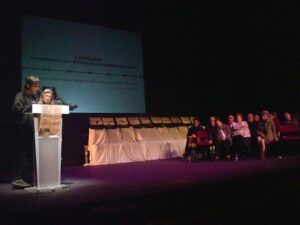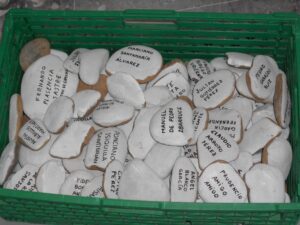Following in the Footsteps of Memory: A Tribute to Franco’s Victims
In Burgos, Spain, close to 700 people paid tribute to the victims of Francoist repression and the International Brigades. ALBA’s Nancy Wallach was there.
The 2015 ALBA/Puffin award, which was granted to Spanish activist Emilio Silva, highlighted one of the central human rights issues in Spain today. Its importance was vividly apparent on my visit to Burgos last April, where I participated in the program “Following the Footsteps of Memory” held at the Teatro de Burgos. Close to 700 people filled the theater in solidarity with the victims of the repression. It was the same theater which only two years earlier had hosted a book launch by a local fascist’s daughter. The Association of the Families of the Disappeared and Assassinated of Burgos had invited me to add my testimony about my father’s experience at San Pedro de Cardeña, the International Brigade concentration camp, to their own. Their invitation demonstrated the role the International Brigades continues to play in today’s anti-fascist efforts in Spain.
The program was held in conjunction with a month-long exhibition at the Burgos Cultural Center, which documented the lives of those recently exhumed from the myriad mass graves of Burgos—an area that was hit hard by the years of the Franco dictatorship, due to the many prisons in the region, including the former monastery that housed the International Brigades concentration camp.

Nancy Wallach on the stage at the Teatro de Burgos with translator and Burgos anti fascist committee organizer Nacho Garcia. Seated in the front row, right to left, are Natividad Roderigo and Lourdes Sastre, coordinator and president of the Families of the Disappeared of Burgos. Photo Diego SU Fotografía.
On April 16, a poignant ceremony took place during an exhumation in which the recovered bodies were returned to their families. An exhibition at the Cultural Center followed through on this recovery of historical memory, as figures who had been formerly anonymous bodies in mass graves were given back their identities, restored through the artifacts, documents and biographies based on the research of historians and authors Luis Castro, Ian Gibson, and Burgos Anti Fascist Committee organizer Nacho García. One of the shocking aspects of the exhibition were reproductions of documents from the fascist authorities officially freeing the prisoners, who, lulled into a false sense of security, were then taken to sites where they were tortured and executed. The work of local forensic anthropologists has helped to establish their identities and the circumstances of their deaths. It was moving to see family members taking in this information. I saw a grandchild playing with a pile of stones containing the names of those recovered from the mass graves, as her mother tried to explain their significance to her.
The exhibition, like the theater program that followed the next day, served a dual purpose, not only uncovering crimes of the fascists, but restoring the dignity and humanity of individual prisoners. For example, a local composer, Antonio José—who much like Lorca had used the folk music of Spain as an inspiration for his own compositions, and who also, like Lorca, had been murdered by a fascist firing squad—had his work performed by a present-day Flamenco company at the Teatro de Burgos. Maurice Ravel predicted this friend of Lorca’s would become “the Spanish composer of our century.” Ian Gibson, Lorca’s biographer, initiated the weekend with a lecture on Franco’s repression and its consequences for Spanish culture.

One of three crates containing the names of the people who were retrieved from mass graves, part of the exhibition at the Burgos cultural center.
Listening to the testimonies of the forensic anthropologists, former prisoners, and family members, I couldn’t help thinking that the title “A Tribute to the Victims” was not wholly accurate, as the term “victim” did not credit the persistence, fortitude and courage it took for the families to pursue their quest to honor and recover the memory of these heroes of Spain. One particularly moving account of the obstacles they still face was delivered by Natividad Rodrigo, who recounted how as a five-year-old she had witnessed her father and pregnant mother murdered by the fascists as a reprisal against her labor activist grandfather. When questioned by the Spanish right why she persists in bringing up the events of 80 years ago instead of “getting over it and moving on,” she replies that “it is now 2000 years since Jesus Christ had been killed,” and asks why her protagonists have not themselves ‘moved on.’”
When it was my turn to speak, I tried to emphasize the same spirit of resistance among the International Brigade prisoners at San Pedro, recounting not only their suffering, but their efforts to retain their humanity and dignity through their underground newspaper, their “University of San Pedro,” and their solidarity in protecting the identities of their officers and comrades who had fled from fascist countries. My father and his fellow Brigadistas would have been proud.
Nancy Wallach, daughter of Lincoln vet Hy Wallace, is an ALBA Board Member













